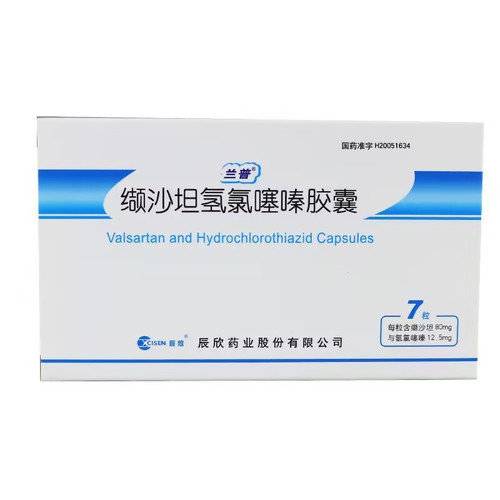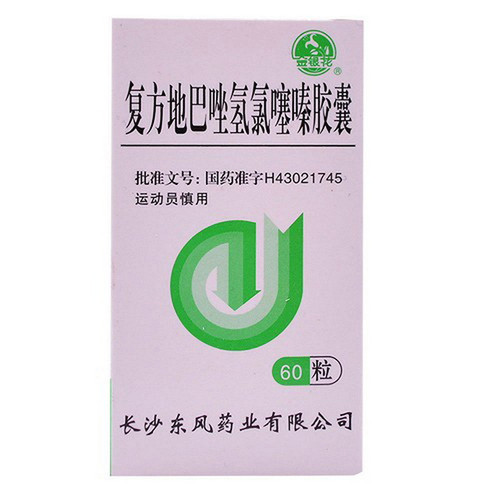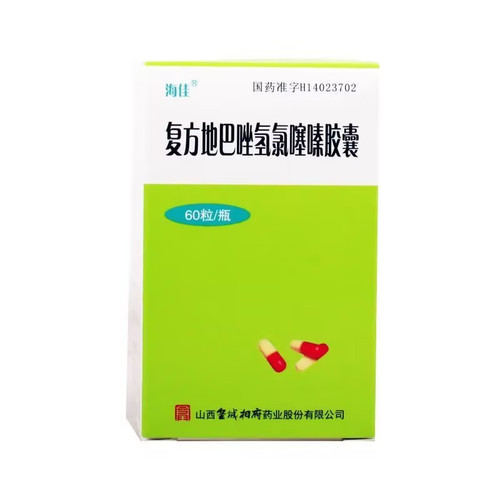Product Overview
[Drug Name]
Generic Name: Irbesartan and Hydrochlorothiazide Capsules
Trade Name: Anlibo Irbesartan and Hydrochlorothiazide Capsules (10 Capsules)
Pinyin Code: AnLiBo EBeiShaTanQingLvZuoZuoJiaoNang 10Li
[Main Ingredients]
Each capsule contains 150mg of irbesartan and 12.5mg of hydrochlorothiazide.
[Appearance]
This product is a capsule containing white granules.
[Indications/Main Functions]
For the treatment of essential hypertension. This fixed-dose combination is indicated for the treatment of patients whose blood pressure is not adequately controlled with irbesartan or hydrochlorothiazide alone.
[Specifications]
10 capsules per 10 boxes
[Dosage and Administration]
This product is taken once daily on an empty stomach or with a meal. It is indicated for the treatment of patients whose blood pressure is not adequately controlled with 150mg of irbesartan or hydrochlorothiazide alone. Patients are advised to adjust their dosage of either single component (i.e., irbesartan or hydrochlorothiazide) and then substitute the combination. A once-daily dose exceeding irbesartan 300mg/hydrochlorothiazide 25mg is not recommended. If necessary, this product can be used in combination with other antihypertensive medications (see Drug Interactions).
[Adverse Reactions]
Common adverse reactions include headache, dizziness, palpitations, and occasional cough. These are generally mild and transient, and most patients tolerate the medication well. Urticaria and angioedema are rare. Literature reports of adverse reactions with an incidence greater than 1% for this product include: dyspepsia, heartburn, diarrhea, skeletal muscle pain, fatigue, and upper respiratory tract infection, but these reactions were not significantly different from the control group. Other adverse reactions reported with an incidence greater than 1% but lower than the control group include abdominal pain, anxiety, nervousness, chest pain, pharyngitis, nausea and vomiting, rash, sinus abnormalities, and tachycardia. The incidence of hypotension and orthostatic hypotension is approximately 0.4%.
[Contraindications]
1. This product is contraindicated in patients allergic to it. 2. It is contraindicated in pregnant and lactating women.
[Drug Interactions]
This product has no significant interactions with hydrochlorothiazide, digoxin, warfarin, or nifedipine. However, when used with diuretics, caution should be exercised regarding hypovolemia or the potential for hypotension due to hyponatremia. When used with potassium-sparing diuretics (such as triamterene), elevated serum potassium should be avoided. Concomitant use with digitalis drugs such as digoxin, beta-blockers such as atenolol, and calcium channel blockers such as nifedipine does not affect the pharmacokinetics of these drugs.
[Precautions]
1. Correct hypovolemia and/or sodium depletion before initiating treatment. 2. Patients with renal insufficiency may require a reduced dose of this product. Furthermore, changes in blood urea nitrogen, serum creatinine, and serum potassium should be monitored. Some sensitive patients may experience changes in renal function as a result of renin-angiotensin-aldosterone inhibition. Overdose of this drug may cause hypotension, tachycardia, or bradycardia, and vomiting, gastric lavage, and supportive care should be employed. Irbesartan cannot be excreted through hemodialysis. 4. Drug Interactions: This drug has no significant interactions with hydrochlorothiazide, digoxin, warfarin, or nifedipine. However, when used with diuretics, caution should be exercised regarding hypovolemia or hyponatremia, which may cause hypotension. When used with potassium-sparing diuretics (such as triamterene), elevated serum potassium should be avoided. Concomitant use with digitalis drugs such as digoxin, beta-blockers such as atenolol, and calcium antagonists such as nifedipine does not affect the pharmacokinetics of these drugs. 5. No dose adjustment is required for this drug in patients with hepatic impairment, mild to moderate renal impairment, or the elderly. 6. Pediatric Use: No safety data are available for patients under 18 years of age.
[Pediatric Use]
No safety data are available for patients under 18 years of age.
[Use in Elderly Patients]
See Precautions.
[Overdose]
Pregnancy and overdose may cause hypotension, tachycardia, or bradycardia. Induce vomiting, gastric lavage, and supportive care should be used. Irbesartan cannot be excreted through hemodialysis.
[Pharmacology and Toxicology]
This product is an angiotensin II (AngI) receptor inhibitor, inhibiting the conversion of Angiotensin I to Angiotensin II. It specifically antagonizes AT1 receptors, with an antagonistic effect greater than 28,500 times that of AT1. By selectively blocking the binding of Angiotensin I to AT1 receptors, it inhibits vasoconstriction and aldosterone release, resulting in a hypotensive effect. This product does not inhibit ACE, renin, or other hormone receptors, nor does it inhibit ion channels involved in blood pressure regulation and sodium homeostasis.








